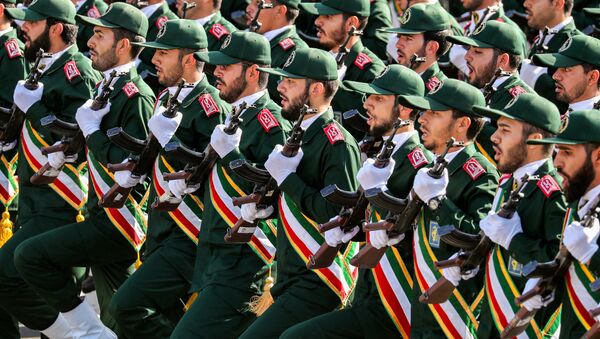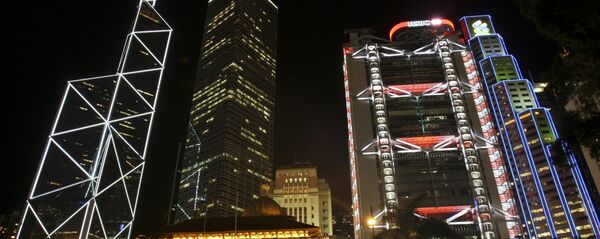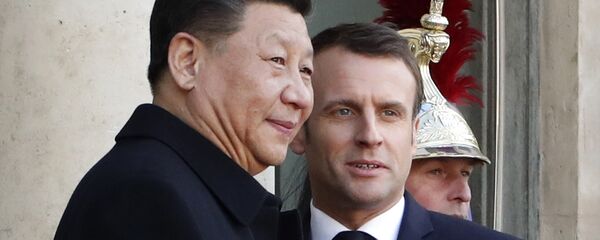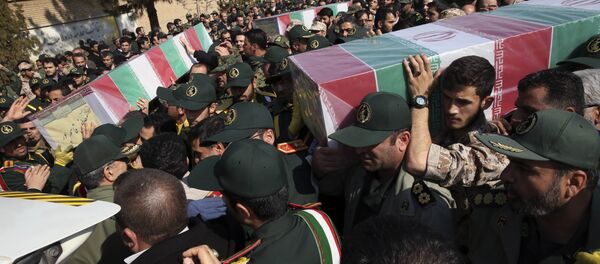US President Donald Trump's decision to designate the Islamic Revolutionary Guard Corps (IRGC) as a terrorist organisation on 8 April has prompted concerns about the potential consequences of the move for American troops and intelligence officers in the Middle East. It is the first time the US named a part of another country's armed forces a terrorist entity.
Trump's Pressure on IRGC Shows Sanctions Fail to Achieve Their Aim
"I think the reason is the feeling that the sanctions so far have not achieved their aim of forcing the Iranian government to make concessions", Meir Litvak, an associate professor at the department of middle eastern history of Tel Aviv University told Sputnik. "And therefore, probably the American administration said they need to increase the pressure on Iran in the belief that because of the major economic role of the IRGC in the Iranian economy, that would have a greater impact on Iran's economy as a whole".
Dr Alam Saleh, a lecturer in Middle Eastern politics at Lancaster University, United Kingdom, echoed Litvak by saying that Trump's recent move was "actually a reaction to Iran's survival in the aftermath of President Trump's withdrawal from the nuclear deal".
Saleh explained that the Iranian Revolutionary Guard "was actually made to protect the revolution", however, "they move beyond this primary resolve and moved into more cultural, economic, political, diplomatic activities, and it's actually at the moment a very formidable, powerful Iranian organisation that deals with almost everything".
The IRGC, which was established in 1979 with the aim of protecting the Islamic Revolution, plays an important role in Iran's social and economic life, having about 125,000 active duty personnel, overseeing business and ideological issues in the country and controlling a paramilitary national force, the Basij.
Why Trump's Measures Will Have Negligible Impact on IRGC
Litvak underscored that apart from affecting IRGC-related entities new US sanctions could deal a heavy blow to foreign companies which have business ties with Iranian firms and organisations.
However, he cast doubt on whether the Americans could implement these sanctions as Iranian businesses and their foreign partners would obviously try to circumvent them.
"So it is difficult to say at this moment what the true impact will be in the long run. But it certainly makes the situation more difficult for the Iranians", Litvak said.
In November 2018, the Trump administration granted a temporary waiver to a number of countries for continuing oil trade with Iran in order not to throw the crude market off balance.
"This will be a crucial test: whether or not the US will extend the waver it gave to these countries or the US will demand that they cease all economic links with Iran", Litvak believes, adding that Iraq remains "the weak link in the American effort because Iraq depends on Iran on many issues".
For his part, Saleh argues that Trump's latest sanctions "would not have any direct consequences for Iran's economy or security" and "would have a very negligible economic impact or effect on the IRGC".
Following the US pull-out from the Joint Comprehensive Plan of Action (JCPOA), in May 2018, Trump gave foreign companies from 90 to 180 days to wind down their business with Iran. On 6 August, Washington launched its first round of restrictions against the Islamic Republic and on 5 November, the US president re-imposed sanctions targeting oil sales and the energy industry, shipping, banking, insurance and etc. In addition, Washington pressured the Society for Worldwide Interbank Financial Telecommunication (SWIFT) into suspending Iranian bank's access to its services.
US Forces and Bases are Now a 'Soft Target' for IRGC
In response to Trump's recent move which is due to come into force on 15 April, Iran designated US Central Command a "terrorist organisation" and named the US administration a "supporter of terrorism".
Commenting on the matter, Litvak expressed doubts that Iran would actually take measures against the US Armed Forces, suggesting that "an armed conflict would not be in Iran's favour".
Dr. Michael Barak, a researcher at the Moshe Dayan Center for Middle Eastern and African Studies, echoed the Israeli professor, by saying that he did not see "a possible deteriorating to a direct military war", since "both sides are not interested in that".
According to Saleh, the White House's decision is likely to limit Washington's influence in the Middle East and take its toll on US military in the region.
"It would limit the United States' regional influence directly, because they won't be able to negotiate with many politicians across the region who have a direct connection with the IRGC or are dealing with the IRGC, let's say, in Iraq, in Lebanon, in Syria and so on", the academic highlighted.
He believes that Trump's crackdown against the IRGC "would actually have a counterproductive effect on US policy in the region".
"And, of course, it would put US servicemen and their military bases at risk in the region", the academic added. "Tehran has also designated US personnel and military bases in the region as terrorist bases in one way or another".
Saleh believes that "actually US forces and bases are at the moment too weak in the region".
"We have a few thousand here and there and they can easily become a soft target for the Revolutionary Guard to react against when needed, or whenever they wanted to", the British professor explained. "This is particularly important, since now, legally for Tehran, these forces are treated by the US as terrorist groups, so they don't need to legally justify their actions".
When asked about the international reaction to Washington's move against the IRGC, Saleh emphasised that at the moment Israel supported and welcomed Trump's decision. Later, Saudi Arabia and Bahrain also endorsed Trump's move. Meanwhile, EU member states have not voiced their views on Trump's renewed sanctions spree against Iran.
The views and opinions expressed by the speakers do not necessarily reflect those of Sputnik.






